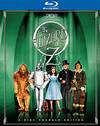





The Sound of Music (1965)
Cast | Crew | Awards | Articles | Dictionary | Bibliography | Downloads | Links | Image Credits
| Page 5 |
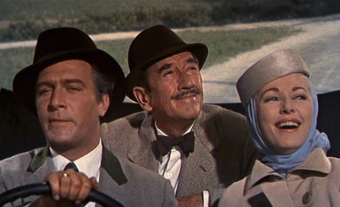 Captain von Trapp returns from Vienna with guests in tow: his glamorous love interest, Baroness Elsa Schraeder (Eleanor Parker), and enterprising family friend/ chaperone, Max Detweiler (Richard Hayden). Although Eleanor Parker was by far the best-known film star to appear in THE SOUND OF MUSIC at the time of its release, the almost-conspiratorial matrimonial plotting that takes place between Max and Elsa in the stage production was virtually eliminated from the movie, reducing the screen-time significance of both characters, but making the movie's baroness a much more sympathetic romantic leading lady. Two songs from the stage production involving Frau Schraeder -- "How Can Love Survive?" with Max, and "No Way to Stop It" with Max and Georg -- were also cut from the film, better refining the movie's use of the music dynamic in plot development. In the stage production, all the characters in the play sing because it is a musical. In the film version of THE SOUND OF MUSIC, when individual characters are moved to sing together, they find themselves united by the music. Characters who don't sing together share a less intimate relationship than those who do. In the film, when the singing starts, Elsa quips that she should have brought along her harmonica -- a humorous line, but one that demonstrates her exclusion from the musical bond that develops between the others. |
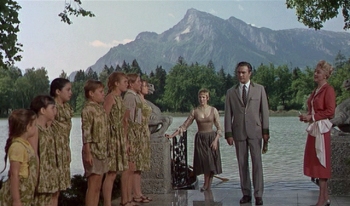 The captain is far from amused when he arrives home to find his children and their governess soaked to the skin, having tumbled out of a canoe into the lake in their excitement to see him. After immediately ordering the children inside to clean up and get back into their uniforms, he confronts Fraulein Maria about the play clothes and the children's extra-curricular activities climbing trees. She, in turn, proceeds to tell the captain a few things about his children that he is never home long enough to notice. Angered at her outspokenness, Captain von Trapp dismisses Maria and orders her to return to the abbey. In the silence that follows this pronouncement, the captain hears music coming from the house and goes inside to investigate. |
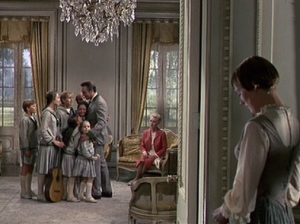 Astounded to discover his children singing "The Sound of Music" for the baroness, the captain is moved to join them, and over the course of the song, the estranged family reconnects through the music. Though British stage actor Christopher Plummer originally intended to do his own singing for THE SOUND OF MUSIC, his musical contributions to the film were eventually re-recorded in post-production by voice artist Bill Lee who had recorded musical numbers for John Kerr in SOUTH PACIFIC (1958) and voiced animated characters for numerous Disney feature films.
Catching a glimpse of Maria in the doorway and grateful to her for bringing music back into his house, the captain changes his mind about dismissing her and asks Maria to stay. Armed with a better understanding of the captain and his intentions toward the baroness, Maria continues on with the family, redefining her governess role to include the task of preparing the children for a new mother. |
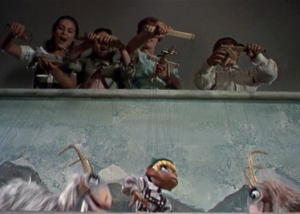 Under Maria's tutelage, the von Trapp children's musical talents expand to include puppeteering, as demonstrated by the marionette show they put on for Uncle Max, the baroness and their father. Originally written for the thunderstorm scene in Maria's bedroom, "The Lonely Goatherd" is another example of structural changes screenwriter Ernest Lehman made to the stage story in adapting it for the screen. In the play, Maria and the Mother Abbess sing "My Favorite Things" in her office before Maria leaves the abbey. Lehman moved that song to the thunderstorm scene in Maria's bedroom and used that scene's original song, "The Lonely Goatherd," for a new and completely separate puppet show number: "High on a hill lived a lonely goatherd. Lay-ee ode lay-ee ode lay-hee
hoo. Loud was the voice of the lonely goatherd: Lay-ee ode lay-ee ode-loo.
|
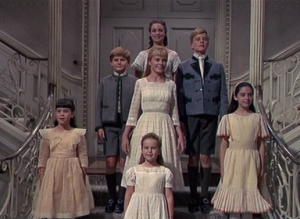 The children next add light dancing to their repertoire as demonstrated when they sing goodnight to their father's guests at the grand and glorious party Captain von Trapp gives to introduce the baroness to his Salzburg friends: "So long. Farewell. Auf wiedersehen. Goodnight." "There's a sad sort of clanging from the clock in the hall and the bells in the steeple too. And up in the nursery an absurd little bird is popping out to say cuckoo. Regretfully they tell us, but firmly they compel us, to say goodbye to you..."
(For help opening the multimedia files, visit the plug-ins page.) |
|
Go to the next page. |
| Now in Print! |
|---|
| Now on DVD! |
|---|
Buy Videos & DVDs |
|
Buy Movie Posters |
|
Buy Movie Posters |
|
Classic
Movie Merchandise |
|
![]() Printer-friendly version.
Printer-friendly version.
![]() Return
to the top.
Return
to the top.
Last updated:
June 21, 2010.
Reel Classics is a registered trademark of Reel Classics, L.L.C.
© 1997-2010 Reel Classics, L.L.C. All rights reserved. No
copyright is claimed on non-original or licensed material.
Terms of
Use.





